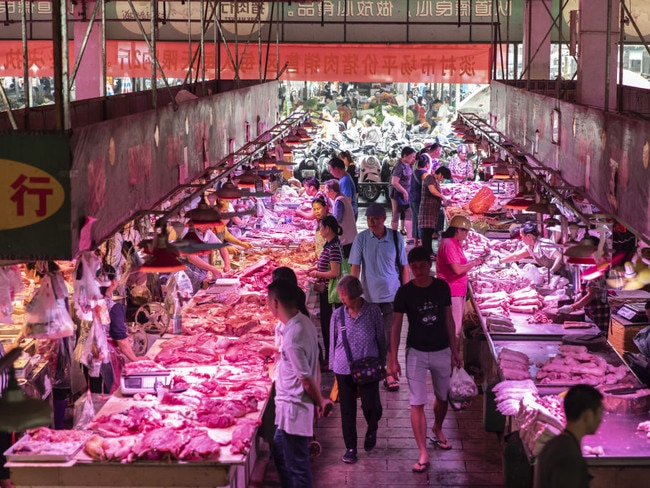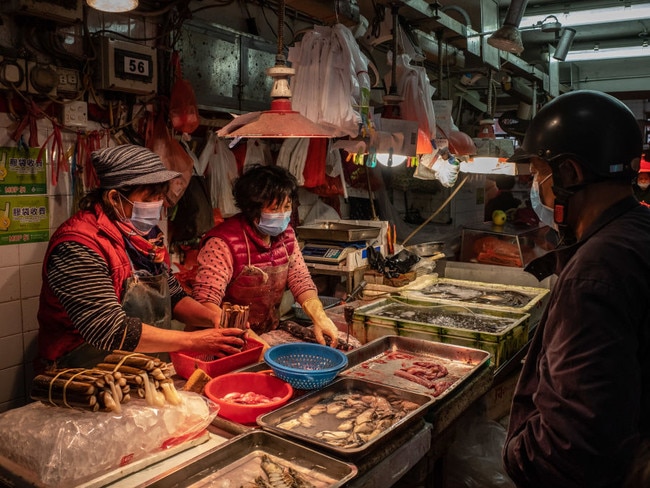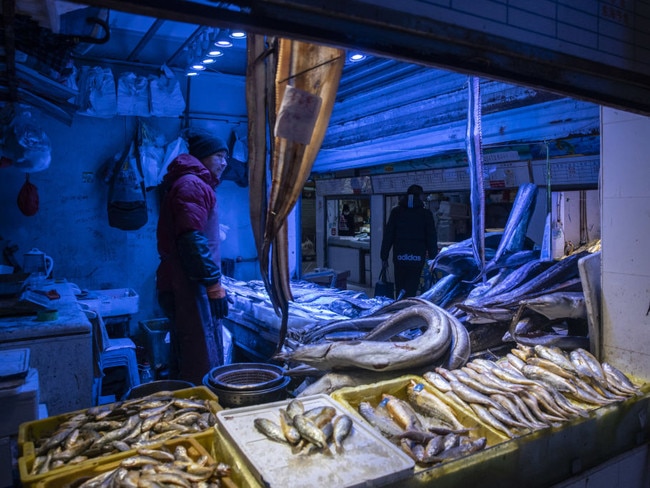Study into China’s wet markets claims to have found 18 ‘potentially high risk’ viruses
An alarming new study has again put the spotlight on China’s popular wet markets, claiming they posed a “potentially high risk”.
News
Don't miss out on the headlines from News. Followed categories will be added to My News.
A new study conducted by scientists around the globe has again put the spotlight on China’s wet markets, cautioning leaders of “another pandemic accident waiting to happen”.
The research, released on November 12, claims to have uncovered dozens of viruses lingering in exotic food across the nation’s food industry.
The study, authored by scientists from Australia, China, the United States and Belgium, claims to have identified cross-species transmission of several animal viruses. These included a bat-associated coronavirus in a civet, a swine pneumovirus found in pangolins and a coronavirus linked to birds found in porcupines.
The 40-page document, supported by the National Key Research and Development Programme of China, was released on bioRxiv, an open access website for preprint scientific studies. It is currently awaiting peer review and publication.
“This study highlights exactly why the wildlife trade and live animal markets are a pandemic accident waiting to happen,” co-author Edward Holmes, an evolutionary biologist at the University of Sydney and recipient of the Prime Minister‘s Prize for Science, said this month.
“This paper also shows that humans regularly transmit their viruses to other animals. There‘s clearly two-way virus traffic.”
According to The Straits Times, the study into more than a dozen species of game animals traded as exotic food in China identified 71 mammalian viruses, believed to be “emerging” viral pathogens. 18 of which have been deemed “potentially high risk”.
The research did not claim to find anything resembling Sars-CoV-2, which sparked the Covid-19 pandemic, however the authors revealed that strains carried by bats are transmitted across the species barrier to infect other animals in “spillover events that risk seeding dangerous outbreaks”.
Civets, the species blamed for the spread of SARS in China some 20 years ago, were found to be carrying the most troubling microbes.
“A further species jump from civets into humans could easily start a major outbreak,” Professor Holmes continued, sounding the alarm for potential virus leaks that could wreak havoc across the planet.
“The animals sold as game in live animal markets carry a wide range of viral pathogens. The right virus in the right animal at the right time could easily trigger a global pandemic.”


Nanjing Agricultural University veterinary medicine professor Shuo Su researched 1725 game animals from 16 species commonly hunted and consumed across 19 provinces in the mainland.
According to the report, among the dozens of mammalian viruses identified over the past five years, 45 had not previously been identified.
“With the exception of pangolins, there has been little investigation of game animals, even though they have close contact with humans and domestic animals and, hence, provide a link to other wildlife species,” the authors said.
The new claims add yet another twist in the ongoing hunt for the origins of the Covid-19 pandemic.
There are two major theories that are currently being debated on – that the virus either crossed to humans at the Huanan Seafood Market in Wuhan, or that it escaped from the Wuhan Institute of Virology as a lab-manufactured disease.
The World Health Organisation’s report into the origins of the pandemic previously suggested transmission from pangolins and bats were the most likely source.
However, new evidence suggests neither species were sold in Wuhan before Covid appeared.
Researchers and commentators the world over have suggested Covid was engineered to be hyper-infectious – but China has denied all allegations of wrongdoing.

In September, new findings revealed American leaders were warned of a new coronavirus circulating in Wuhan a staggering five months before the World Health Organisation declared the virus a pandemic.
According to claims by Chinese whistleblower Wei Jingsheng, that crucial early warning – which came six long weeks before China admitted an outbreak had occurred – fell on deaf ears. The former Chinese Communist Party insider’s repeated attempts to warn the world of the deadly looming crisis were ignored.
“I felt they were not as concerned as I was, so I tried my best to provide more detail and information,” Jingsheng said in Sky News’ documentary, What Really Happened in Wuhan.
“They may not believe that a government of a country would do something like that (cover up a virus), so I kept repeating myself in an effort … to persuade them.”
Originally published as Study into China’s wet markets claims to have found 18 ‘potentially high risk’ viruses



